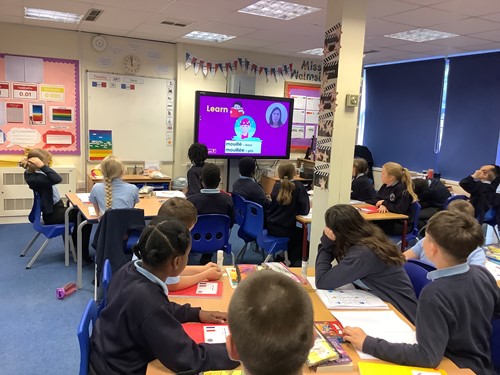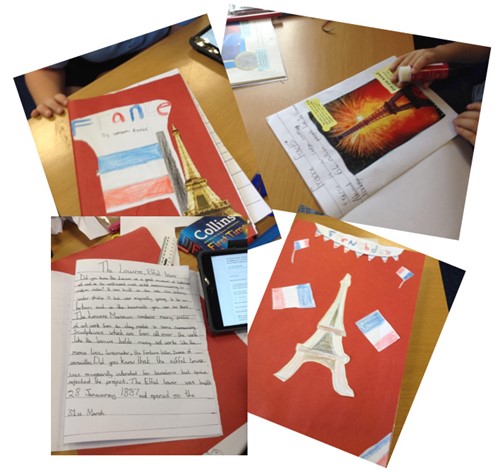Modern Foreign Language- French
At William Reynolds Primary School, we want our pupils to be enthusiastic, engaged and challenged and to develop their ability to use and understand another language.
Our four principle aims for French – from the National Curriculum in England - are for all pupils to:
- understand and respond to spoken and written language from a variety of authentic sources
- speak with increasing confidence, fluency and spontaneity, finding ways of communicating what they want to say, including through discussion and asking questions, and continually improving the accuracy of their pronunciation and intonation
- write at varying length, for different purposes and audiences, using the variety of grammatical structures that they have learnt
- discover and develop an appreciation of a range of writing in the language studied.
We believe that learning a Modern Foreign Language helps to prepare our pupils for life in modern Britain and provides them with the skills to participate in further education, work and other activities that are carried out in languages other than English.

The core of our Modern Foreign Languages curriculum is the National Curriculum for England which is supported by the Primary Languages Network and the use of Widgits. The Ofsted research review for languages (June 2021) explained that learning a language helps to equip pupils with the knowledge and cultural capital they need to succeed in life.
The curriculum has been specifically sequenced in a logical progression to ensure that new knowledge and skills build on what has been taught before: Year 3 to Year 6. This enables our pupils to know more and remember more. End points are identified for each year group through a whole school French progression plan. The sequence develops pupils’ linguistical skills over time; we use the basis of the 3 Pillars (phonics, grammar and vocabulary) to aid progression in speaking, listening, reading and writing in French.
All pupils in key stage 2 participate in six units of French throughout the year. Pupils access at least 30 minutes per week of taught French where they apply the 3 pillars to speak, listen, read and write.
Every year group has a yearly Curriculum Map that outlines the units of French which will be taught throughout the year. This ensures that an adequate amount of time and coverage is allocated to each key area.
Medium Term planning, from the Primary Languages Network, supports teachers to plan a sequence of progressive lessons and over time, giving the children opportunities to master new learning. Within this document key objectives are outlined as well as the key performance indicators. Progression documents, used to support the Medium-term plan, ensure that staff are delivering a consistent curriculum that increases in complexity.

To support teachers’ own CPD, we use the Primary Language Network to make the teaching and learning of primary foreign languages effective and accessible by using the native speaking resources to aid delivery of lessons. This ensures that the learning is creative, purposeful and memorable for all learners. Teachers use Widgits to create visual resources to support the pupils. The Widgits include new vocabulary in both English and French with a picture to support them to write grammatically correct sentences.
All lessons start with a warmup where pupils revisit recently and previously learned phrases and vocabulary. In most lessons, pupils will revisit phrases and vocabulary from the previous lesson. After this, pupils move onto new learning and consolidation from the previous lesson. Pupils then practise their speaking and listening skills through partner work and visual tasks before completing a written task in their French books, using Widgits to compose 3 or more sentences. Within the lesson, teachers check pupils understanding effectively and address any misconceptions through regular feedback.
Throughout key stage 2, pupils listen attentively to spoken language and show understanding by joining in and responding and engage in conversations; ask and answer questions; express opinions and respond to those of others. Pupils can speak in sentences, using familiar vocabulary, phrases and basic language structures and develop accurate pronunciation and intonation so that others understand when they are reading aloud. In lessons, pupils read carefully, and show understanding of words, phrases and simple writing and write phrases from memory, and adapt these to create new sentences, to express ideas clearly. They can describe people, places, things and actions orally and in writing and understand basic grammar appropriate to the language being studied, including feminine and masculine form.

The impact of our curriculum is that all pupils:
- speak French confidently with increasing accuracy of their pronunciation and intonation
- write sentences in French for different purposes and audiences
- foster a love of languages
- have an understanding of a different culture
- are prepared for the next stage of education.
- Teachers are supported through the Primary Languages Network programme


